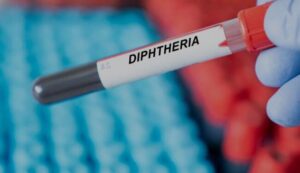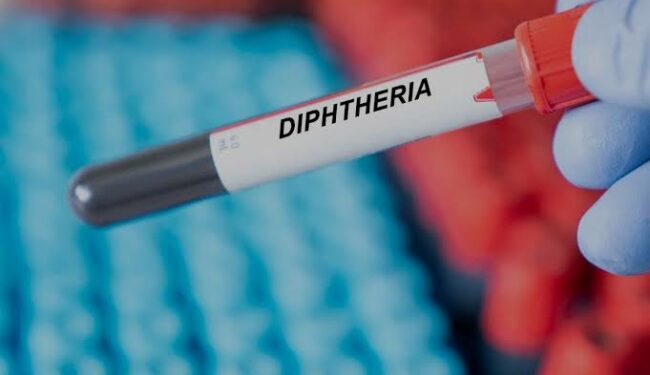
The Federal Government on Tuesdays called on governors of the 19 states with confirmed cases of diphtheria to reintroduce face mask-wearing at public gatherings.
It said the advice was necessary because the confirmed cases had soared to 8,406.
The cases were recorded in 114 local government areas (LGAs) in 18 of the 36 states and Abuja.
Diphtheria is a highly contagious vaccine-preventable disease caused by strains of bacteria called Corynebacterium. It causes difficulty breathing, heart rhythm problems, and death.
Like the coronavirus (COVID-19), which led to the worldwide mandatory use of facemasks, diphtheria spreads among people mainly by direct contact or through the air via respiratory droplets.
The Nigeria Centre for Disease Control and Prevention (NCDC) said about three months ago that the FCT recorded the first case that resulted in the death of a four-year-old.
At a news conference yesterday, the Executive Director of the National Primary Health Care Development Agency (NPHCDA), Dr Faisal Shuaib, and NCDC Director-General, Dr Ifedayo Adetifa, said out of the 8,406 confirmed cases, 6,202 (73.7 per cent) were of victims aged between one year and 14 years.
The news conference was also attended by World Health Organisation (WHO) Deputy Country Representative, Alexander Chimbaru, and Country Director of the United States Centres for Disease Control and Prevention (USCDC), Mary Boyd.
Adetifa, who gave the breakdown of the cases, described Kano as the epicentre of the disease.
According to him, Kano State has reported 7,188 cases, representing 86 per cent of the total infection.
Yobe State ranks second with 775 cases, Katsina, 232; Borno, 118; Jigawa, 23; Bauchi, 20; Kaduna, 17; Lagos, eight and FCT, six; Gombe, five; Osun, three; Sokoto, three and Niger, two.
Cross River Enugu, Imo, Nasarawa, Kebbi, and Zamfara states have one each.
Adetifa said: “As of today (yesterday), there have been 13,204 reported suspected cases, out of which 8,406 were confirmed cases from 114 local government areas in 19 states and the FCT.
“Of the 8,406 confirmed cases, 6,202 (73.7 per cent) were aged one to 14 years. Infants: less than one per cent; one to four years: 14.40 per cent; five to nine years: 32.2 per cent; 10 to 14 years: 27.1 per cent; adults above 20 years: 15 per cent.
“Our records have shown that most of the confirmed cases of diphtheria in the country were unvaccinated against diphtheria.
“Of the 8,406 confirmed cases, 5,371 (64 per cent) are either unvaccinated or partially vaccinated, 966 (11 per cent) have an unknown vaccination status, and 2,069 (25 per cent) are fully vaccinated against diphtheria.
“The recently deployed National Rapid Response Teams (NRRTs) are offering on-site surveillance and response support in affected states.’’
He added that the NCDC had activated diphtheria surveillance and public health measures in the affected states and FCT.
Adetifa explained that through laboratory networking, the NCDC had continued to conduct preliminary and confirmatory testing at sub-national and national levels.
He added, “Currently, NCDC has 14 laboratories in the Diphtheria Laboratory Network with the capacity to support diphtheria testing.
“Optimisation of five additional laboratories at the subnational level is currently ongoing.
“NCDC has conducted training for laboratory personnel at the sub-national level on diagnostic processes, quality assurance, biosafety, biosecurity procedures, and data management.”
Adetifa also said the installation of laboratory equipment (biosafety cabinets, autoclaves, and incubators) was ongoing in Kaduna, Katsina, and Bauchi states to assist in the optimisation of laboratories there.
He said security challenges were limiting accessibility for some NRRTs in some local government areas.
Shuaib, who is also the co-chair of the National Emergency Task Force and Coordination for Diphtheria in Nigeria, called on “governors of the affected states to institute face-covering requirements, such as facemasks in public gatherings.”
He said, “Diphtheria is an airborne disease. Like COVID-19, we can reduce air contact with bacteria by adopting non-pharmaceutical interventions, such as the use of facemasks, hand washing, and physical distancing from affected persons.
However, this should be done in a way that does not stigmatise or discriminate against sick people.
“Accordingly, I would like to call on governors of the affected states to institute face-covering requirements, such as facemasks, in public gatherings. By so doing, we can add another intervention to slow the progress of the outbreak.”
Shuaib added that the government believes that vaccination remains the most potent weapon against diphtheria.
He explained that Nigeria has two vaccines: Pentavalent, which is administered to children aged six weeks to four years, and Tetanus-diphtheria (Td), for children aged between four years and 14 years.
According to him, in recent months, the government has launched rapid and comprehensive vaccination campaigns across the affected states.
Shuaib said: “Kano, as the epicentre of this outbreak, has been at the forefront of our vaccination efforts.
Working with the state governments, we implemented Rounds One and Two of the vaccination campaign in five high-burden local government areas (LGAs) in February and April 2023, respectively.”
“Subsequently, Round Three was integrated with routine immunisation intensification, further bolstering our response.
An additional eight LGAs in Kano underwent reactive vaccination exercises in the last week of August.
“Beyond Kano, we expanded our response to include Kaduna, Katsina, Bauchi, and Yobe in our Phase One response.
These states engaged, trained, and executed vaccination campaigns in 25 high-burden LGAs within their borders, with the commencement of reactive vaccination in August 2023.
“Borno State also conducted reactive vaccination exercises in four LGAs during the same period.
WHO’s Deputy Country Representative, Chimbaru, called for the involvement of traditional, religious, and community leaders in the vaccination of children.
He said, “It is very critical to bring traditional, religious, and community leaders together to support the vaccination of children.
Diphtheria is a highly infectious disease and a cause for concern. The vaccines being used now are safe and effective.
“Nigeria has the pentavalent vaccine. We applaud the government for providing the vaccines free of charge.
We will support surveillance and coordination of activities in terms of communication and community engagement. We need to have the communities come on board to tackle the disease.”
USCDC Country Director Boyd commended the Federal Government for setting up the task force on diphtheria.
She said, “In Nigeria, we are seeing quite a number of deaths, up to 14 years. We are not just addressing the specific outbreak but also building systems that will help the country better respond to future outbreaks.”
